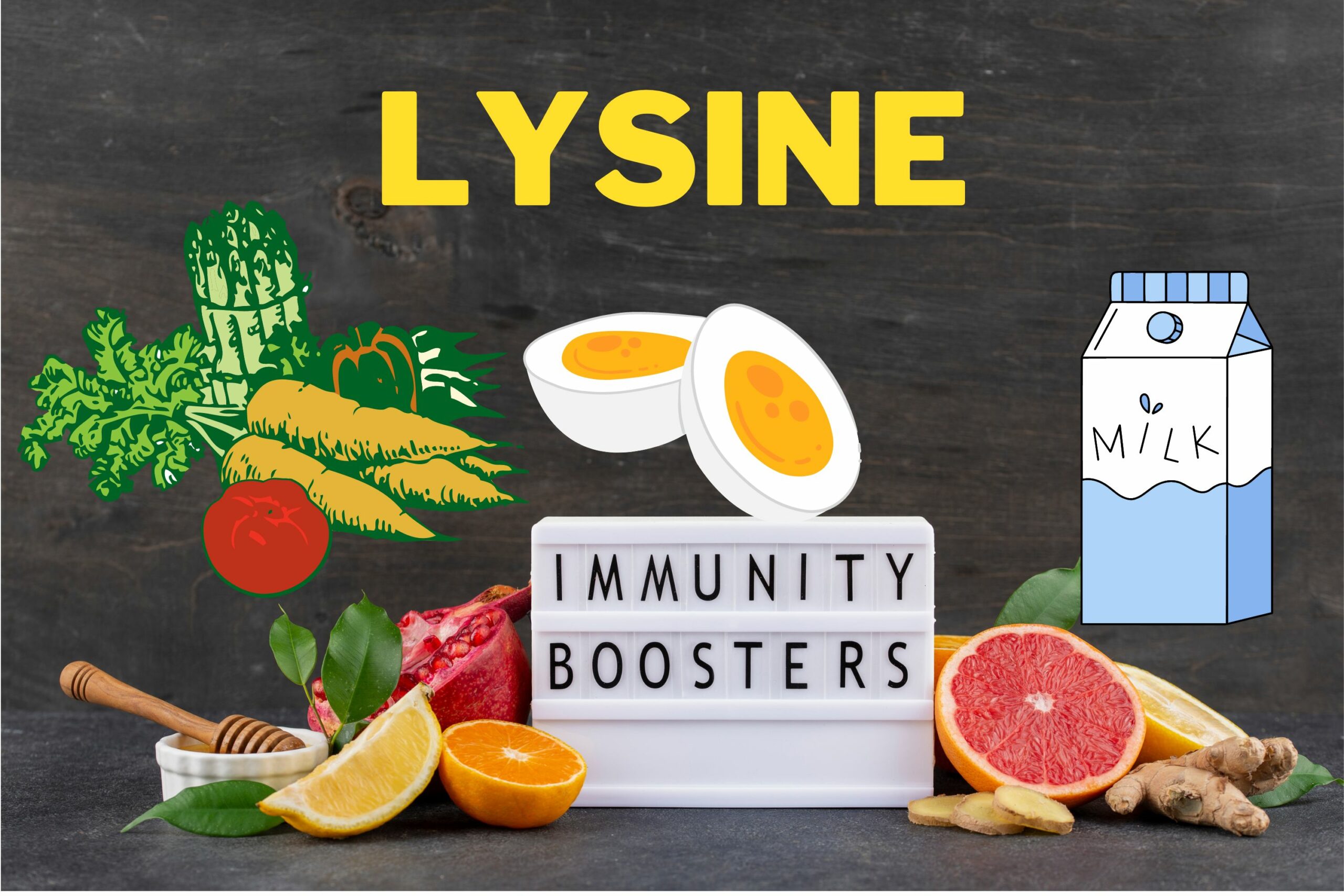Last updated on May 6th, 2023 at 07:52 am
Are you suffering from tiredness, difficulty concentrating, grumpiness, sickness, bloodshot eyes, balding, loss of appetite, stunted growth, low iron, or fertility issues? This might be a sign of lysine deficiency.
Our bodies require a large number of nutrients to function and sustain themselves and many of us are aware of nutrients like proteins, vitamins, and minerals which we need to maintain our health. However, there are other nutrients like amino acids which we might not be aware of that play a fundamental role in health, nutrition, and immunity. These amino acids are divided into essential and non-essential groups where essential amino acids are those amino acids that our bodies need but can not synthesize on their own and have to obtain through diet, supplements, or other amino acids.
Essential amino acids are required for protein synthesis, hormone production, tissue growth and repair, immunity and to produce of other non-essential amino acids. In the absence of amino acids, our bodies start to break down our muscles to maintain adequate levels of these essential amino acids. There are 9 essential amino acids that our bodies can’t produce and one of them is lysine.
What is Lysine Amino Acid?
Lysine is one of the 20 amino acids that our bodies need to perform various functions including the production of various proteins, enzymes, hormones, and even collagen which gives structure to our body. As an amino acid lysine helps in the metabolism of minerals and fatty acids. It modifies histones which are needed for gene expression and DNA compaction. Lysine is also involved in the regulation of growth hormones and can affect growth patterns.
In the late nineteenth century, lysine was isolated for the first time by a German chemist, from a protein known as casein. The chemical structure of lysine was identified in the year 1902 by Emil Fischer and Fritz Weigert.
Chemically, lysine (abbreviated as Lys or K) is an aliphatic acid with an α-amino, α-carboxylic acid group along with epsilon-lysine (side chain lysyl). Just like all the other amino acids lysine too has an α-carbon at the center of its structure. The α-carbon of lysine is a chiral carbon that gives two possible types of lysine, L-lysine, and D-lysine. Lysine can exist in the form of either L-lysine or D-lysine or it can exist as a mixture of the two.
Only the L-lysine form of lysine is required for the body’s nutritional requirements and it is utilized as one of the building blocks of proteins that our body produces. On the other hand, D-lysine is not needed for protein synthesis and it is metabolized in a different way in the body and may be used as a therapeutic in the management of conditions like epilepsy.
Lysine Benefits
Lysine for Immunity
Lysine is an essential amino acid that helps in the metabolism of several nutrients including vitamin C, and b complex all of which are essential for robust immunity.
It might help reduce the duration and severity of several viral infections like shingles, herpes, influenza, and HIV.
Lysine is good for Cold Sores
A research study with more than 50 participants found that supplementing with l-lysine helped reduce the occurrence of cold sores in those individuals who have had herpes simplex virus (HSV) infections in the past.
How much lysine to take for Cold Sores
The research found that treatment with 1000 mg of l-lysine taken 3 times a day for six months results in a significant reduction of occurrence, healing time, and severity of cold sores caused by HSV.
L-lysine increases the production of antibodies which our bodies use to fight off infections. It supports immune response by aiding in the production of hormones and enzymes which strengthen our body’s capability to fight off infections. Lysine inhibits the production of inflammation-causing cytokines which can lead to chronic inflammation that affects every organ of the body and reduces cell life.
In a study done on an animal model, it was observed that a diet deficient in lysine increased the production of pro-inflammatory cytokines which affected vital organs like the kidney, spleen, and liver.
Lysine for Athletes
People engaged in high-intensity physical activities such as construction workers, bodybuilders, and athletes are at a high risk of bone and muscle injuries. Lysine helps the body absorb calcium which is needed to repair and build bone in the body. Lysine helps in the production of collagen which is vital for muscle health as it gives muscles their structure. Lysine also helps in the absorption of calcium from a high protein diet which is important as a high protein diet has been linked to loss of calcium through urine which may lead to osteoporosis.
High-intensity exercise may put athletes under oxidative stress which affects organs like the lungs, heart, and kidneys this might affect the performance and strength of the athlete. Lysine helps the body to counter oxidative stress and increase the production of proteins like collagen which plays an important role in lung health and oxygen intake capacity.
Lysine for Inflammation
Lysine can help prevent chronic inflammation as Lysine inhibits the production of pro-inflammatory prostaglandins and Leutrokrines in the body which is produced as an immune response and sometimes our bodies keep producing these pro-inflammatory molecules even in the absence of a cause.
Lysine also helps in preventing inflammation by reducing or preventing the production of other molecules such as nitrous oxide and nuclear factor kappa B(NF-kB) both of which in excess may lead to chronic inflammation and cause many health problems.
Additionally, Lysine has been found to promote the production of anti-oxidants in the body which helps reduce cell damage and further prevents inflammation.
In a research conducted on fishes to study the effects of lysine on the immune response, it was observed that high dietary lysine in the fish feeds improved anti-inflammatory cytokines transforming growth factor β2 production along with heightened immune and anti-oxidant activity lead to longer life span.
As inflammation leads to cell damage and lysine is involved in the production of collagen a diet rich in lysine might help in cell growth and accelerated muscle generation.
Lysine for Hair
Collagen and its effect on hair and scalp health are well-established and thoroughly documented. As we age our body’s ability to maintain a healthy scalp reduces and occasional inflammation further deteriorates hair and scalp health leading to increased hair shedding and scalp issues.
In one study lysine and iron, supplementation was given to women who suffered from hair loss and it was observed that this combination of nutritional supplements helped stop hair shedding and improved overall hair quality.
However, it is important to note that nutritional supplements must be only used under proper guidance as these studies are not done on a large scale and we are yet to understand the exact mechanism of lysine and its effects on hair health.
lysine Food Sources
Lysine along with threonine and tryptophan is a limiting amino acid present in cereals, maize, and legumes. A deficiency of limiting amino acids in the body makes it hard for the body to properly utilize the nutrients available in the diet. Certain diets may make this deficiency worse and it is important for us to eat a well-balanced diet.
Lysine is found in many foods which we regularly eat, some of them are:
Meat and Poultry:
- Beef
- Chicken
- Pork
- Other Poultry And Meat
Fish and Seafood:
- Tuna
- Salmon
- Other Fish
- Shellfish
Plant-based sources:
- Soybeans
- Tofu
- Tempeh
- Seitan
- Quinoa
- Amaranth
- Beans
- Lentils
- Chickpeas
- Avocados
Dairy and Eggs:
- Milk
- Ricotta Cheese
- Parmesan Cheese
- Other Types Of Cheese
- Yogurt
- Eggs
Out of these foods beef and fish are great sources of dietary lysine and can be utilized to counteract lysine deficiency. It is important to note that lysine absorption is dependent on the availability of other nutrients like Vitamin C.
Lysine absorption is also dependent on the amount of arginine present in the food source as arginine hinders its absorption in the body.
Lysine Dosage Per Day
1- The normal range for daily requirements:
- For Adults: 12mg/kg of body weight
- For Children: 44 mg/kg of body weight
- For infants: 97mg/kg of body weight
Infants and children need more lysine because their bodies are growing at a much faster rate than adults which means a higher rate of proteinogenesis which requires higher lysine in their diet.
2- How much lysine to take for cold sores (HSV):
- For men and women: 1000 mg, 3 times a day for 6 months.
Please note that this range is taken from research and depends on the severity and intensity of HSV infection. Always take proper guidance from health care experts before self-treating any condition.
Lysine Side effects
Lysine is generally safe to consume through dietary sources as it is required by the body to function normally. However, in large doses, it may present some health issues, like:
Gastrointestinal symptoms
- Nausea
- Diarrhea
- Stomach Cramps
Allergic reaction
- Itching
- Hive
- Difficulty breathing
Kidney issues
- High calcium excretion
- Kidney stones
Precautions
Lysine supplements must be avoided in case you are taking antibiotics. Aminoglycosides are a group of antibiotics used to treat severe infections and lysine can react with them making it harmful to the kidneys and liver.
Takeaways
Lysine is an essential amino acid, one of the building blocks of protein, which our bodies need but can’t produce on their own. It helps in the metabolism of minerals and fatty acids and modifies histones needed for gene expression and DNA compaction. Lysine is required for robust immunity as it supports the production of antibodies and aids in the production of hormones and enzymes that strengthen our body’s capability to fight off infections. Lysine can also help reduce the duration and severity of several viral infections like shingles, herpes, influenza, and HIV. It also supports athletes by aiding the body to absorb calcium, which is needed to repair and build bones and helps to counter oxidative stress. Lysine can prevent chronic inflammation by inhibiting the production of pro-inflammatory molecules and promoting the production of anti-oxidants that reduce cell damage. The L-lysine form of lysine is required for the body’s nutritional requirements and is utilized as one of the building blocks of proteins. On the other hand, D-lysine is not needed for protein synthesis and can be used as a therapeutic in the management of conditions like epilepsy.



